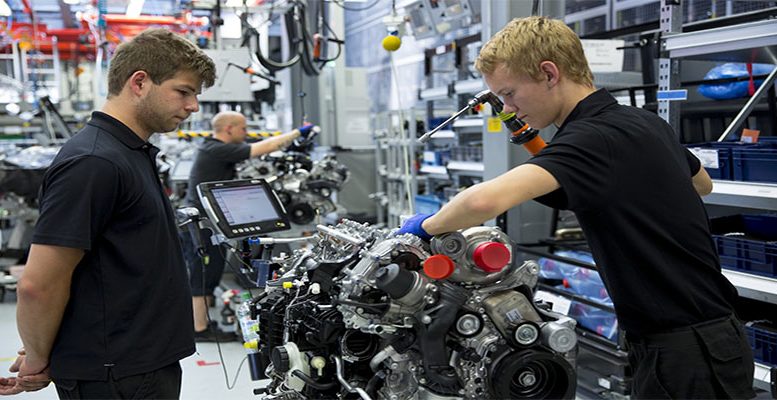Germany is still Germany because ‘Made in Germany’ is the most highly valued manufacturing brand in the world. Particularly in the US, its main market. For that reason Germany is so attentive to everything that President Trump says and signs. Of Germany’s exports, 8.9% goes to the US, followed by France (8.4%), the UK (7.1%), Holland (6.6%) and China (6.3%). And what is surprising that in spite of Trump, Marine le Pen, Brexit or the threat from populism, the German economy is booming. Low interest rates is one of the reasons for this. They are driving the construction sector and exports of machines and cars across the globe.
But there are also very worrying trends, like automation, which could fuel political turbulence and get rid of a lot of qualified workers in Germany. Factories are interconnected, speeding up processes and cutting costs. Furthermore, the whole automotive industry, from Daimler to Volkswagen, is making a bet on electric cars. VW wants to manufacture 1 million annually in the next 10 years. A drastic loss of jobs is feared. There was always restructuring in this industry, but this is going much further. Andreas Tschiesner, from McKinsey, talks of “the biggest technological change in the history of the automotive industry.” And the IAB research institute at Nuremberg says much the same: 1.5 million jobs will be lost in Germany up until 2025.
What is also worrying is the middle class’ loss of purchasing power. A German government report says that 40% of the country’s workers earn less than in the mid-1990s. An indicator of the imbalances in the way the German economy’s success has been distributed. For sociologist Oliver Nachtwey, from Darmstadt, the return of the myth of the working class is linked to the fall in industrial production in the West. And according to World Bank data, between 1995 and 2016 contribution from industry to GDP fell from 29.1% to 23.4% in Italy, and from 30% to 20.7% in the US. In Germany, however, the drop was just from 32.9% to 30.5%. This meant the loss of 1 million jobs in industry. When the economy stopped growing due to the 2008 crisis, the loss of industrial fabric became a serious problem.
Writer and journalist Thomas Steinfeld explains that “Trump’s rise has been parallel with the shock caused by the extent of the strength of unneccesary work accumulated in the US. (…) And instead of trying to find the political and economic reasons for this loss of jobs, the proletariat is convinced that the responsability for this misery lies with the board of directors of the big consortia and with the US government.
Poorer paid jobs
In any event, “there is not enough work for everyone to be able to live off it,” says US economic historian James Livingston, from Rutgers University, in his book “No More Work”. “With the jobs that are available you can’t pay the bills, unless you are a drugs trafficker or a Wall Street banker.” At the same time, in the US there is de facto full employment, Thomas Steinfeld points out. But a quarter of workers earn so little that they live below the official poverty line.
In Germany, the middle class has also been shrinking since the turn of the century. It no longer represents a majority, but less than half of the population. In Germany this represents a severe blow to social consensus. Because the middle class – singles with net monthly income of between 1,500 and 2,500 euros and families with 3,000-5,500 euros – symbolises the ideal of the cushy life: their own house, annual holidays abroad and the possibility of paying for their children’s university. And the rise in employment has also not prevented this decline in the middle class. Since the 1980s and 1990s many have seen their income stagnating. Globalisation, the advance of technology and the relaxation of labour laws have led to poorer paid jobs. Social climbing is more difficult. But the descent is easier than a few years ago. The promise of increasing well-being has been broken.
That said, this advance of populism could end up being more difficult than advertised. We can see it in the US and now in Europe. Whatsmore, the likelihood of Trump imposing agressive protectionism and his “Trumponomics” is decreasing. Good news for the global economy. So for the time being, Germany has decided to be optimistic.





